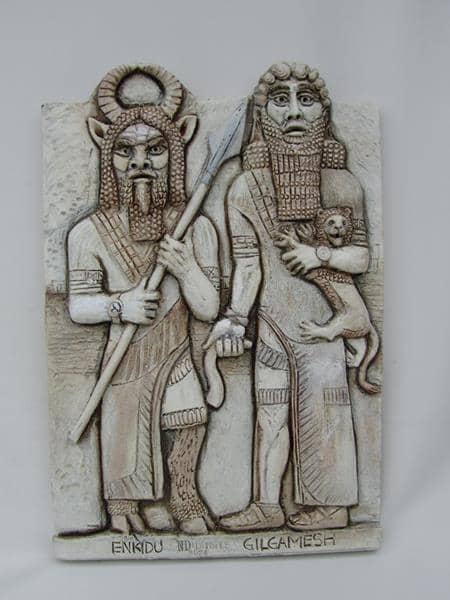In The Epic of Gilgamesh the relationship between Gilgamesh, and his companion, Enkidu, is deeply intertwined with their dreams. Over the course of the epic, this relationship evolves from that of rivals, to master and servant, to battle ally, to physical companion, and eventually culminating in a deep spiritual connection. Through a series of powerful and haunting dream sequences, the two heroes are able to understand each other on a deeper level and their bond grows stronger.
One of the first examples of Enkidu interpreting dreams happens when Gilgamesh shares with him a dream he has had about Enlil, the father of the gods. Thus far he has narrated his dreams to his wise and noble mother, Ninsun. After Enkidu comes into his life, Gilgamesh does not seek out his mother’s advice on dreams. He has transitioned this relationship from his mother to his companion. Enkidu explains that the dream means that the gods have given Gilgamesh, the king, “unexampled supremacy over the people” (Sandars, 70), but also that the king needs to use his power in a just way under the watchful eye of the all-powerful deity; “Do not abuse this power, deal justly with your servants in the palace, deal justly before Shamash” (70). Gilgamesh is comfortable sharing his dream with Enkidu and being guided about its meaning.
Gods created Enkidu to balance Gilgamesh’s excessive pride and arrogance. As predicted in a dream interpretation by his Ninsun, “This star of heaven…when you tried to move it, it would not budge…you will love him as a woman and he will never forsake you”, (66). Gilgamesh has gone from viewing Enkidu as a rival to a trusted friend. Enkidu is also comfortable going beyond merely translating the dream, to providing sage advice through his interpretation. They have started to forge a relationship of equals.
Confronting enemies and fighting challenges is an important part of the narrative. As the story evolves, the role of dreams also starts to become significant in battle. Conversations between Gilgamesh and Enkidu serve as a means of building morale, making them better companions and heroes. This is highlighted during the episode about the journey to the cedar forest to fight the beast Humbaba. Gilgamesh has dreams that make him unsure about taking on the fight, “..my arm was seized, my tongue bitten. I fell back on my knee” (78). Enkidu urges Gilgamesh to look at his dreams as positive signs that are guiding them towards accepting the challenge which will lead to eternal glory, “… together we will accomplish a work the fame of which will never die.” (78). He gives Gilgamesh the confidence to continue their adventures together. Later on, Gilgamesh talks about seeing a mountain falling on his feet, and then someone pulling him out from under the mountain and giving him water. Enkidu interprets, “Now, surely, we will seize and kill him, and throw his body down as the mountain fell on the plain” (78). Both Gilgamesh and Enkidu are burdened with not only the physical challenge of defeating Humbaba, but also the emotional challenge of defying all the gods who have urged them not to go into this battle. Their dialog about dreams helps them overcome the emotional and physical challenges during his adventure, eventually leading to success in killing the mighty beast.
In a pivotal passage, when Enkidu is plagued with a fatal sickness, Gilgamesh takes on the role of interpreting his dreams. Enkidu has a series of ominous dreams which foretell of his impending demise. Gilgamesh is distraught with grief at Enkidu’s fate. He tells Enkidu that this dream was fascinating and very disturbing at the same time, “…The dream was marvelous but the terror was great; we must treasure the dream whatever the terror” (93). Gilgamesh values their sharing of ominous dreams along with hopeful ones. They not only share dreams that lead to hope, but also those that foreshadow tragic events like the death of Enkidu.
By the time of Enkidu’s death, he has become the only person who Gilgamesh trusts with his dreams. Enkidu’s passing is the last time the epic mentions Gilgamesh’s dreams as a part of the narrative. After Enkidu’s death there is no one left who shares this connection with Gilgamesh. Their bond has grown so strong that he is haunted by what Enkidu has dreamt and suffered. The trauma drives him on a quest to find the source of immortality, “Because I am afraid of death, I will go best as I can to find Utnapishtim…for he has entered the assembly of the gods” (97).
The outcome of Gilgamesh’s quest for immortality has also been foretold by Enkidu in interpreting an earlier dream, “The father of the gods has given you kingship, such is your destiny, everlasting life is not your destiny” (90). His futile search leads him right back to where he started and to his only everlasting legacy, the city of Uruk. There is a repetition of the lines quoted at the beginning, “You were given the kingship, which was your destiny, everlasting life was not your destiny. Because of this do not be sad at heart” (118). Enkidu’s words of wise interpretation provide the final advice given to the king.
Dreams are used as a powerful tool to exhibit the strengthening of the relationship between Gilgamesh and Enkidu in The Epic of Gilgamesh. Dreams are used as a recurring motif to explore the thoughts of the principal characters, their hopes, aspirations, and deep-seated fears. They form the basis for the evolution of the relationship between Gilgamesh and Enkidu, allowing them to share common experiences and to understand each other’s feelings and thoughts more fully.
Works Cited
- “The Epic of Gilgamesh”, Translated by N. K. Sandars, Penguin Classics, © 1972
